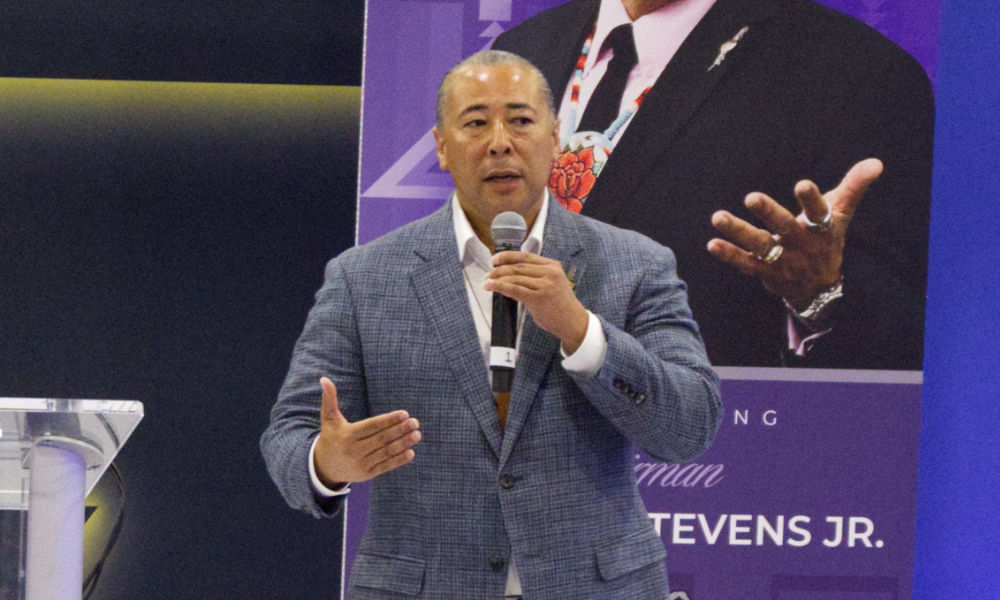David Bean, the acting chair of the Indian Gaming Association, said sports betting on prediction markets is one of the greatest threats tribes have faced and vowed a vigorous fight to defend tribal sovereignty.
A member of the Puyallup Tribe in Washington state, Bean served as vice chair of the trade group and is in line to become the next full-time head after the death of Chairman Ernie Stevens, Jr. Bean sat down with CDC Gaming during last week’s Global Gaming Expo in Las Vegas to talk about tribal gaming, Chairman Stevens’ legacy, and challenges of dealing with a federal government shutdown.
Tribal and commercial casino operators, as well as state regulators and lawmakers, argue that prediction markets are illegal, because they offering sports betting outside of state or tribal regulation. Their right to operate under the auspices of the federal Commodity Futures Trading Commission is currently being fought in the federal courts.
“We’ve had many threats, but this is by far one of the biggest,” Bean said. “I anticipate continuously defending against it.”
CDC: What makes prediction markets the biggest threat and what are you doing about them?
Bean: Sweepstakes aren’t as large of a threat as prediction markets. This is so new that a year ago at G2E, nobody was talking about them. It came upon us out of the blue. We talked about our collective approach between the Indian Gaming Association and the National Congress of American Indians at our mid-year conference, creating a task force, our strategy, and talking points. It’s first and foremost about protecting Indian gaming and following the law. We’re the heaviest regulated industry — tribal, state, and federal regulators. We understand, respect, and follow the law. But what happens when folks operate in a world where most laws and rules don’t apply to them? The promises the federal government has made to tribes with treaties have never been fully honored. Indian gaming has been the great economic equalizer, allowing us to fully take care of our communities, as we’ve done since the beginning of time. We don’t like to fight, but we will vigorously defend tribal sovereignty and Indian gaming and promote diversifying tribal economies.
CDC: Why is that important?
Bean: That’s a continuation of Chairman Stevens’s work. He dedicated his life and spent millions of miles in the air and hundreds of thousands of miles on the road. We’ll carry on his legacy by visiting tribal communities and organizations and let them know our mission hasn’t changed. We have to continue moving forward together.
CDC: Where do you think prediction markets will be a year from now?
Bean: I don’t think this will go away overnight. If we have to go through the courts, that could take years. We fully anticipate going to the Supreme Court, but I don’t know how quickly it gets there. We’ll fully explore (lawsuits).
CDC: What is the concern about the government shutdown?
Bean: The shutdown is out of our control, but we continue to educate members of Congress about how it impacts tribal communities. Housing, education, healthcare, public safety — all are impacted. You listen to Congress point fingers at each other, but people are suffering. Not just tribes, but United States citizens are suffering.
CDC: Where does everything stand with filling the position of IGA’s chairmanship with the death of Ernie Stevens?
Bean: It’s so new that we haven’t even talked about a transition, but the expectation is that as vice chair, I’ll step up and fill his role as acting chairman until we have a special election, either this spring at our annual conference in San Diego or at the end of his term. He just got elected this year to a two-year term. The folks who set up the organization anticipated a lot of this, so we’ll review the bylaws and move forward accordingly.
CDC: The position of chair is a full-time paid position. What are your plans if and when you’re formally named chair?
Bean: The expectation is to spend more time in Washington, D.C., carrying out the chairman’s work, and educating lawmakers, and advocating for Indian Country. Also working with tribes around the country and the National Indian Gaming Commission protecting Indian gaming. The chairman set a pace that is very difficult to keep up with, but we’ll do our best. He had an incredible team in place, so collectively we’ll carry on in his footsteps.
CDC: What do you do back home in Washington state?
Bean: Back home, I’m a former tribal chairman for the Puyallup Tribe of Indians. I’m also an entrepreneur. I have my own tobacco distribution and a retail store. It gave me the flexibility to get up and go when the chairman needed me to be in D.C. or a tribal event.
CDC: What is it like to have all of this public responsibility thrown at you at once?
Bean: Being thrust into the public spotlight was not challenging. It was the way it happened. None of us expected to lose Chairman Stevens. He was our superhero and superheroes are supposed to be invincible. The reality is he was human and at the beginning and end of every day, he was a family man, and that’s the reminder. The hard part is moving forward without him. He was our rock and our warrior who was first in. But he’d be the first to say he had a team that he lifted up to make sure he wouldn’t go into any battle (alone).
CDC: How difficult will it be to succeed Chairman Stevens?
Bean: I don’t think we’ll ever be able to fill his shoes. He blazed a path at one million miles an hour in many directions. We’ll continue to charge forward, but it’s going to be hard to replicate.
CDC: What is your leadership style?
Bean: My sleeves have always been rolled up. I consider myself a workhouse. I tell folks I don’t need the title to do the work. I just want to get the work done. It is not going to be any different than the Chairman. He had a suit on at all times. I’m a little more casual, but I’m going to roll up my sleeves, which is symbolic of getting to work and getting after it. Back home, I’m a husband, father, and grandfather and I participate in our community the same way the chairman did throughout Indian Country — at school and with our kids, singing and dancing, and paddling our canoes. I practice our harbor treaty rights. I’m a diver and physically active and I feel that has prepared me to continue on with the chairman’s work. Again, we’re not going to be able to fill his shoes, but we can carry on his journey and continue his work together.
CDC: What words do you have for tribal nations?
Bean: For Indian Country, our mission doesn’t change with the passing of Chairman Stevens. It’s the same as if he’s here. We believe he’s still with us through his lessons and the steps he’s taken. We’ll continue down that same path. The Indian Gaming Association doesn’t change. Our north star doesn’t change. We will continue to move forward together and Indian gaming itself is in good hands.


